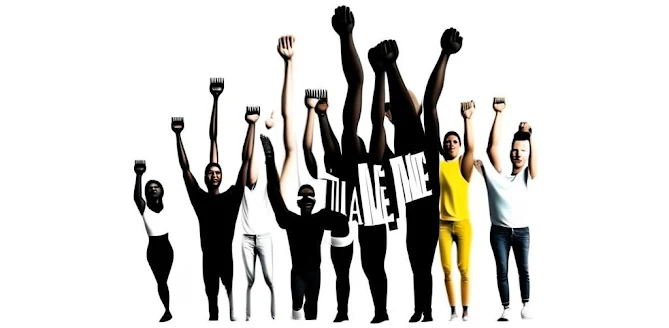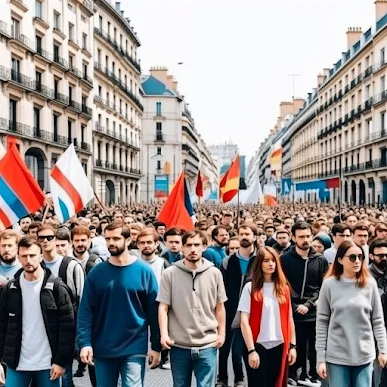The Power of the Masses
The Voice of the People that Makes
Change
Introduction
The masses have always played a crucial role in shaping history.
They are the engine of change in history. From popular revolutions that
overthrew tyrannical regimes to contemporary social movements that have led to
fundamental changes in society, the masses have proven time and time again that
they are a force that cannot be ignored
A Brief History of the Mass Movement
Throughout history, the masses have proven time and time again their ability to shake up existing regimes and shape their future, which have changed the face of the world, such as
Ancient Revolutions: History has witnessed many revolutions led by the masses, such as the French Revolution and the Russian Revolution, where the masses played a crucial role in overthrowing monarchies and tyrannies
National Movements: National movements around the world have been a striking example of the power of the masses to achieve independence and self-determination, such as the Indian independence movement and the African liberation movement
Social Movements: In the modern era, social movements have emerged that demand social justice and equality, such as the civil rights movement in the United States and the women’s rights movement
How can public opinion influence government actions
Public opinion has a huge impact on governments, and the most
important mechanisms of this influence can be summarized in the following
points
Pressure on decision-makers: When a strong public opinion crystallizes around a particular issue, decision-makers feel pressure to meet the demands of the masses for fear of losing popular support
Directing public policies: Public opinion can directly influence the formulation of public policies, as governments usually seek to satisfy voters and maintain their popularity
Making radical changes: In some
cases, public opinion can lead to radical changes in the political system, as
has happened in many popular revolutions
Determining government priorities: Public opinion determines government priorities, as governments usually seek to address issues that concern citizens
Monitoring government performance: Public opinion plays an important role in monitoring government performance and holding them accountable for any shortcomings or corruption
Factors affecting the strength of public opinion influence
There are many factors that affect the strength of public opinion
influence, including:
Unity of opinion: The more
unified public opinion is around a particular issue, the greater its ability to
influence
Organization: Organizations and associations play an important role in mobilizing and directing public opinion
Media: The media plays a crucial role in shaping and disseminating public opinion
Political awareness: The higher the level of political awareness among citizens, the greater their ability to participate in decision-making
Challenges facing the influence of public opinion
Despite the enormous power of public opinion, it faces many
challenges, including
Manipulating public opinion: Public
opinion can be manipulated by spreading fake news and propaganda campaigns
The power of lobbies: Lobbies may influence decision-makers in favor of their own interests, which weakens the influence of public opinion
Difficulty measuring public opinion: Public opinion can be difficult to accurately measure, making it difficult to assess its impact on governments
Examples of the voice of the people making history
Public opinion, as an expression of the will of the masses, has
enormous power to influence political and social decisions. Here are some
examples
The fall of regimes: In many
cases, massive popular pressure has led to the fall of dictatorial regimes, as
happened in many Arab countries during the Arab Spring
Changing legislation: Public opinion can force governments to change legislation and laws that do not meet the aspirations of the people, as has happened in many cases related to human rights and the environment.
Directing the economy: Public opinion can influence the direction of the economy by supporting local products or boycotting them, as has happened in many movements supporting organic products and social justice
The impact of crowd power on governments
The power of the crowd supported by social media has led to
fundamental changes in the way governments interact with their citizens. The
most prominent of these changes are
Increased transparency: Governments
have become more aware of the importance of transparency, as citizens can now
monitor their actions and publish any violations
Rapid response to demands: Governments are forced to respond faster to the demands of the public, fearing negative reactions on social media
Changing policies: The public can pressure governments to change their policies and laws, as has happened in many cases around the world\
Examples of the impact of crowd power in the modern era
Arab Spring: social media played a crucial role in the
outbreak of popular revolutions in many Arab countries, as it contributed to
organizing protests and raising awareness of the issues that people suffer from
Global protest movements: In recent years, we have witnessed the emergence of many global protest movements, such as the #MeToo movement and the Black Lives Matter movement, which used social media to mobilize millions of people around the world
The impact of crowd power on companies
Crowd power greatly affects companies in
the modern era, it is the collective ability of individuals to influence
companies and other institutions by expressing their opinions and demands in a
collective and organized manner. The most important of these effects can be
summarized in the following points
Changing policies: The crowd can force companies to change
their policies and practices if these policies cause harm to society or the
environment
Improving the company's image: Positive campaigns can improve the company's image with the public, leading to increased sales and customer loyalty
Avoiding crises: Companies that listen to the voice of the crowd and respond to their demands can avoid crises that may harm their reputation
Innovation: Crowd power can drive companies to innovate and develop new products and services that meet consumer needs
This power manifests itself in many forms, such as
Boycott: Consumers decide to boycott a company’s
products or services in protest of its policies or practices
Advertising campaigns: Launching large-scale media campaigns to raise awareness of certain issues and influence public opinion
Social media pressure: Using social media platforms to spread information and organize virtual protests
Collaboration with NGOs: Working with NGOs to promote common causes
Crowd power tools
Crowds use a variety of tools to exercise
their power, the most important of which are
Social media: Social media platforms such as Facebook,
Twitter, and Instagram are a powerful tool for spreading information and
organizing protests
Websites: Crowds can create websites for their campaigns to raise public awareness of their cause
Electronic signatures: Electronic signatures allow crowds to express their support for various issues in an easy and quick way
Demonstrations and marches: Demonstrations and marches are traditional means of expressing protest
The Role of social media in Empowering the Crowd
Social media has completely changed the
game, allowing the masses to
Organize quickly: The masses can now organize and express
their demands much faster than in the past. By creating groups and pages on
social media, activists can easily communicate and coordinate their efforts
Raise awareness: social media allows information and news to be disseminated quickly and effectively, which contributes to raising awareness of important issues and mobilizing public opinion
Influence public opinion: Activists can use social media to influence public opinion and shape the media agenda, forcing governments and companies to respond to their demands
Circumvent censorship: Despite governments’ attempts to impose censorship on social media, activists are using innovative ways to circumvent this censorship and spread their opinions
Despite the immense power of the masses supported by social media, they also face many challenges, including
Misinformation and disinformation: Misinformation and disinformation spread
rapidly on social media, which can distort facts and undermine trust in
institutions
Polarization: social media can foster social and political polarization, making it difficult to reach common solutions to complex issues
Manipulation of public opinion: Companies and governments can use data analytics and digital marketing tools to manipulate public opinion and influence people’s behavior
Conclusion
The power of the masses is a real force
that cannot be denied or ignored. It represents the hope for positive change.
It is the voice that expresses the aspirations and hopes of millions of people.
Citizens must exercise their right to express their opinions and participate in
decision-making, and work together to build more just and equal societies
Despite the challenges that the masses face in organizing themselves and expressing their opinions, history proves that the power of the masses is the force that shapes the future
Ultimately, it can be said that the power of the masses is the power of real change, and it is the power that can build a more just and equal society


